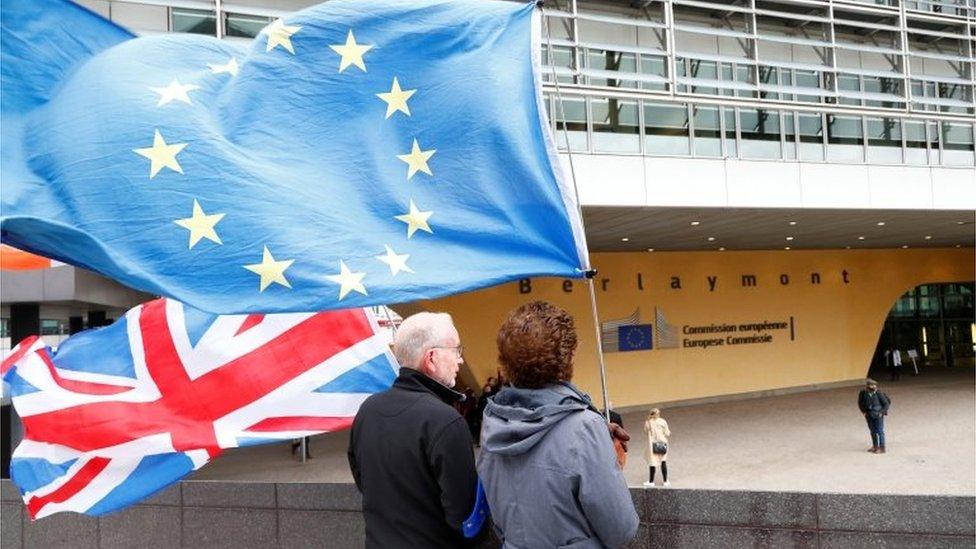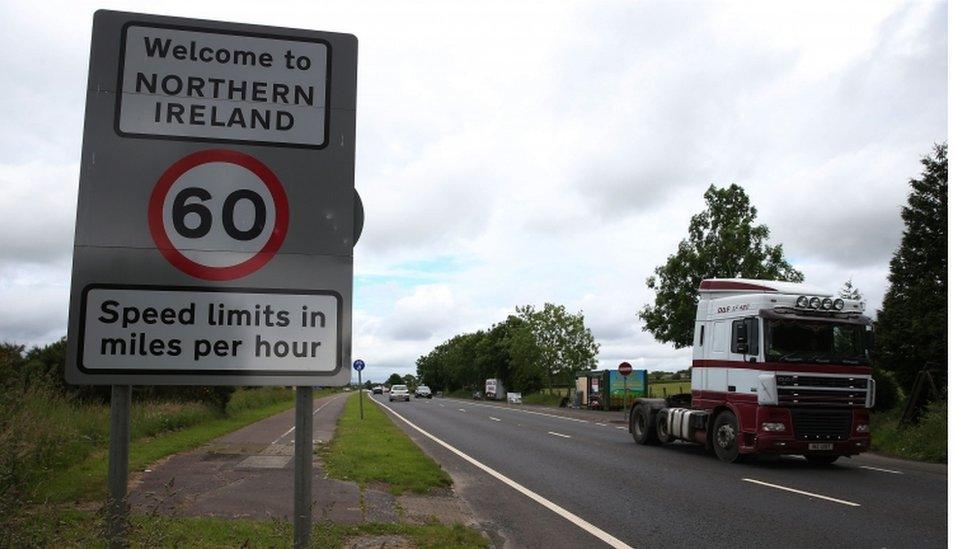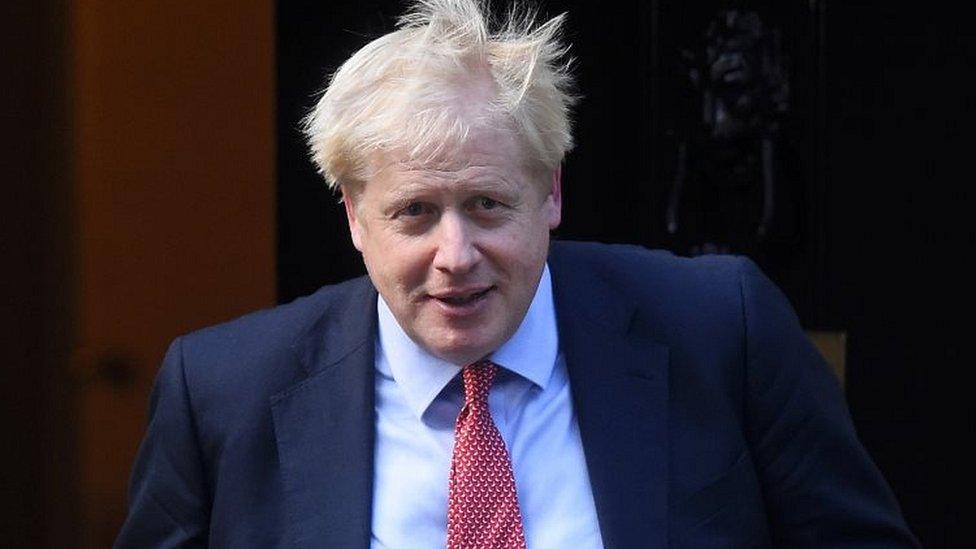Brexit: Talks continuing amid claims deal is close
- Published
- comments

Downing Street is playing down reports of an imminent Brexit deal with the EU, saying talks are still ongoing.
Prime Minister Boris Johnson is under pressure to get a fresh agreement by Thursday's EU summit, but his spokesman said there was "more work still to do".
EU chief negotiator Michel Barnier had said the two sides must agree the details by the end of Tuesday.
But the BBC's Laura Kuenssberg said it was not clear whether a text could be signed off by then.
She said Mr Barnier was due to brief EU ambassadors at 1300 BST on Wednesday, after a possible European Commissioners meeting, meaning a new deal could get the "green light" from Brussels in the afternoon.
The Guardian is reporting that a draft treaty, external could be published on Wednesday morning, claiming the UK has made further concessions over the issue of customs and the Irish border.
The prime minister's official spokesman said: "Talks remain constructive but there is more work still to do."
Meanwhile, Irish Taoiseach Leo Varadkar said talks were "moving in the right direction" but gaps between the sides remained, and it was still unclear whether a deal would be ready in time for the Brussels summit.
His deputy, Tánaiste Simon Coveney, said earlier that "big steps" were needed on Tuesday "to build on progress that has been slow" because there would be no haggling over the details of the text once the summit began.
Brexiteers and the DUP
The two-day EU summit is crucial because, under legislation passed last month - the Benn Act - the PM must get a new deal approved by MPs by Saturday if he is to avoid asking for a delay.
The UK is due to leave the EU at 23:00 GMT on 31 October and Boris Johnson says that deadline must be honoured.
He is trying to hold together a coalition of Conservative Brexiteers and Democratic Unionists in support of his proposed alternative to the Irish backstop - the arrangement designed to keep an open border in Ireland.
"We need to deal with the facts," say the Irish deputy PM
The DUP leader, Arlene Foster, had more than an hour of talks in Downing Street on Monday night and met the PM again on Tuesday evening for a further 90 minutes.
Following that meeting, the DUP released a statement saying it would not give "a detailed commentary" but added "it would be fair to indicate gaps remain and further work is required".
Earlier, Mrs Foster had told the BBC her party would "stick with our principles" that Northern Ireland "must remain" within the UK's customs union.
She dismissed as "speculation" claims the new Brexit deal included a possible customs border in the Irish Sea - meaning Northern Ireland would be treated differently from the rest of the UK - saying the DUP could never accept that.
Giving the Northern Ireland Assembly a regular vote on post-Brexit customs arrangements - which is reported to have been ditched in response to Ireland's objections - was also important to the DUP, Mrs Foster said.
She said it was "right to give space and time" to negotiators to try to get a deal, but "everyone knows our position".
'Narrow path'
Earlier on Tuesday, members of the pro-Brexit European Research Group attended a meeting at No 10, with chairman Steve Baker saying afterwards he was "optimistic" that "a tolerable deal" could be reached.
BBC Brussels reporter Adam Fleming said the widely-held view there was that the UK was unlikely to be leaving on 31 October, and the question was whether an extension could be short in order to iron out some small issues, or had to be much longer to deal with bigger problems.
After updating EU ministers on Tuesday morning, Mr Barnier signalled that he expected the UK to share the legal text of any proposed changes to the withdrawal agreement within hours.
He said there was a "narrow path" to be trod between the EU's objective of protecting the single market and Mr Johnson's goal of keeping Northern Ireland in the UK's customs territory.
While there had been progress, Mr Barnier said there was still a big disagreement about the inclusion of so-called "level playing field" provisions in the political declaration sketching out the two sides' future trade relationship.
These provisions would limit the UK's ability to diverge from the EU across a whole range of areas, including competition policy, employment rights, environmental standards and state aid.
The UK says loosening these conditions is vital if it is to have an independent trade policy, but the EU says the UK cannot have privileged access to the single market market without following its rules as this would give it an unfair advantage.
Asked whether it recognised talk of an EU deadline later on Tuesday, No 10 said Mr Johnson was "aware of the time restraints" and the UK was working hard to secure a deal "as soon as possible".
Confused by Brexit jargon? Reality Check unpacks the basics
Regardless of what happens in Brussels, a showdown is anticipated in an emergency sitting of Parliament on Saturday - the first in 37 years, if it goes ahead.
MPs will be able to back or reject any deal presented to them and there will be discussions on what to do next.
Labour has threatened court action to force the PM to obey the Benn Act, amid speculation the PM could seek to sidestep it somehow.
Speaking in Parliament, Leader of the House Jacob Rees-Mogg did not confirm whether the Saturday sitting would definitely go ahead, adding that it would depend on events in Brussels.
Allow X content?
This article contains content provided by X. We ask for your permission before anything is loaded, as they may be using cookies and other technologies. You may want to read X’s cookie policy, external and privacy policy, external before accepting. To view this content choose ‘accept and continue’.


Timeline: What's happening ahead of Brexit deadline?
Thursday, 17 October - Crucial two-day summit of EU leaders begins in Brussels. This is the last such meeting currently scheduled before the Brexit deadline.
Saturday, 19 October - Special sitting of Parliament expected - and the date by which the PM must ask the EU for another delay to Brexit under the Benn Act, if no Brexit deal has been approved by MPs and they have not agreed to the UK leaving with no-deal.
Thursday, 31 October - Date by which the UK is currently due to leave the EU.

- Published15 October 2019
- Published14 October 2019

- Published13 October 2019
